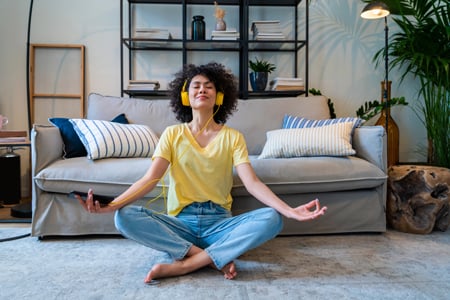“Realise deeply that the present moment is all you have” – Eckhart Tolle
It’s so easy to rush through life. The majority of us live fast-paced lives and often forget to embrace the moment for what it truly is. Mindfulness has been around for the last 2500 years but in recent years has become extremely popular. Mindfulness is the awareness of the present moment without any judgment. This technique is now being used to help individuals with mental health issues as well as to prevent anxiety, depression, and stress.
So how can mindfulness help your mental wellbeing? By bringing you into the present moment, it allows you to enjoy the world around you and experience it for what it has to offer. In being mindful, you are able to learn and understand more about yourself. The process of mindfulness allows us to step back from our thoughts and assess them differently. It helps us become aware of our thoughts and feelings, and this inevitably allows us to notice our anxiety, stress, or depressive thoughts and feelings.
Mindfulness is proven to reduce stress as it improves emotion regulation which inevitably improves one’s mood. It helps reduce the avoidance of stress and moves people towards developing coping strategies as a response to stress. It’s been shown to decrease depression and anxiety as it allows you to identify intense emotions and better understand them.
It is clear that mindfulness has helped in many ways over the past couple of years, but it’s important to understand how and why it has helped. We as humans have the ability to transform our minds by taking responsibility of our brains. In taking responsibility of our brains, we are able to access a state of consciousness that allows us to be aware of our surroundings and is free of conceptual thinking. This brings about a sense of peacefulness in our lives, not only because we are fully embracing what is around us but giving ourselves the time not to think. It gives the ego-mind a chance to take a break from being in control of the thoughts you have, the way you act, and how you feel. By making mindfulness a part of your day, you are taking steps to use your mind instead of being used by your mind.
With this being said, what can we do to become more mindful?
- The Five – Minute Journal
In your journal, you will have a space to write in the morning when you first wake up and, in the evening, before you go to bed. It helps you remain positive for the day and end your day on a high.
In the morning, you write down: What are you grateful for? What would make today great? And Daily affirmation. I am…
At night you write down: 3 Amazing things that happened today or how could I have made today even better? - Move slowly and consciously. Do one task at a time and take your time in doing it. Don’t rush and keep your focus on the tasks at hand.
- Do less. Prioritise what you do and cut back on trivial and avoidable jobs.
- Create gaps between two jobs; this gives you a more hassle-free plan.
- Observe 10 minutes of “DO-NOTHING” on a daily basis. Take deep breaths, rejoice in silence, and become aware of your own feelings and thoughts.
- Meditate – guided meditation will open a whole new world for you.
If you are experiencing thoughts that cause discomfort or unease, it might be the time to consider and start a mindfulness routine that will support you in coming back to the here and now. We have a number of guided meditations in our Plumm library** that you can access to start your mindfulness journey, today!
**Kindly login to explore our library of soundscapes and guided meditations.




